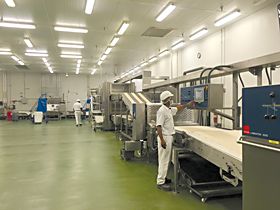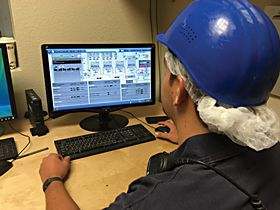Bread is on nearly every restaurant menu. Sandwich makers, for instance, roll through millions of cases of bread each year. Behind the scenes, industrial food manufacturers, such as Tolleson, Arizona-based Southwest Baking Company produce more than 2 million cases of bread annually to keep sandwich makers and other restaurants in business.
Southwest Baking’s bread-making process begins in raw material receiving, where ingredients such as flour, yeast and salt are stored in holding bins until transferred into the batching system. The batching system draws the raw materials from holding bins into an industrial mixer where ingredients are combined. The mixture then moves into production where the bread product is formed and frozen before being packaged, palletized and shipped to distribution centers.
Limited to an outdated, proprietary batch system, Southwest Baking could run only one batch every eight minutes. This kept the factory at only 85 to 90% capacity, based on the machinery’s production power. To meet growing demand, the company required an intuitive solution for improved flexibility.
Batch Challenges
Adding to their growth restrictions, the company was experiencing five to six hours of downtime per month at a cost of thousands of dollars per hour. Sometimes a downtime event would last up to a full day or more while a lone programmer tried to fix the problem.
“When the programmer left the company, knowledge of the system left with him,” says Robert Wroblewski, plant engineer, Southwest Baking. “Our employees didn’t know how to operate [it], leaving us to wait hours for outside support when issues occurred.”
The proprietary platform wasn’t scalable, so Southwest Baking couldn’t expand process lines for future growth. “Beyond scalability, we’d continuously run into situations when new equipment needed to be added or the procedures in our batch process had changed, causing us valuable time reprogramming, starting up and testing before run time,” Wroblewski adds.
In addition, the company’s outdated platform had limited reporting capabilities. Reports were restricted to pulling in data from raw materials receiving and were not accurate or collected consistently. Operators had to gather the data manually at various intervals in the process, leaving room for human error. The system also could store only a few days of data.
Southwest Baking required an easily supported batch solution that was sustainable over the long term and that could track and report critical process data accurately.
Standardized Solution
Southwest Baking collaborated with ECS Solutions Inc. a Recognized System Integrator in the Rockwell Automation PartnerNetwork™ program to help design and implement a replacement for the limited legacy system.
After assessing a number of vendors, Southwest Baking and ECS Solutions chose to standardize on a flexible batch recipe management system using FactoryTalk® Batch software from Rockwell Automation (Figure 1). The company upgraded its control system to Allen-Bradley® ControlLogix® controllers with an advanced HMI interface and process historian.


